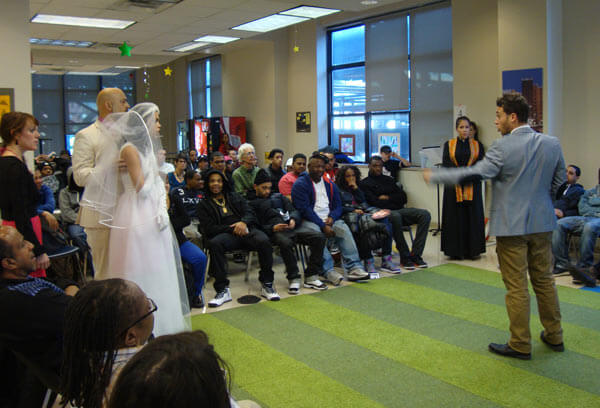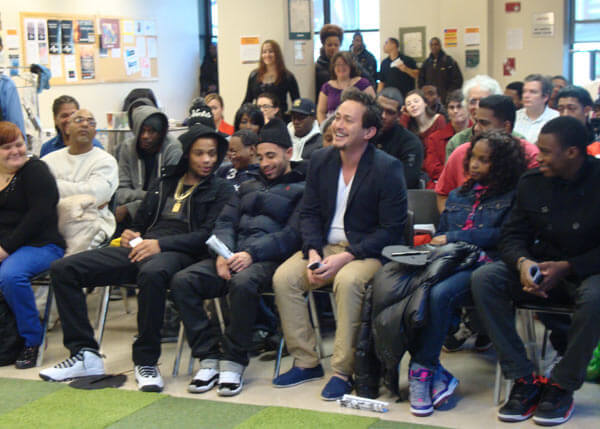By Kevin Zimmerman
Dressed in modern clothes and armed with cell phones and iPods, a troupe of Shakespearean actors jumped onto their makeshift stage in a nondescript office building on Northern Boulevard a couple of weeks ago.
As the performers played out the comical banter and overblown misunderstandings of Beatrice and Benedick in “Much Ado About Nothing,” their world-weary audience members in this facility for recently paroled men and women became part of the show.
“Once you go black, you never go back,” one woman shouted to the white actress and African-American actor as the duo played out a flirtation scene.
While yelling to cast members may be frowned upon on Broadway, The Public Theater’s Mobile Shakespeare Unit welcomed the involvement of its audience during the show.
“They are part of it,” said actor Ramsey Faragallah. “They should be part of it. When it’s good, they get it and when it’s not, they let you know.”
This was the third time in two years that The Public’s performers have made the trip out to Long Island City to present Shakespeare for clients of The Fortune Society.
Founded in 1967, The Fortune Society provides educational and job training opportunities each year for 3,000 men and women working their way through the criminal justice system. Programs like the Public’s help expose these individuals to the arts, said Stanley Richards, senior vice president of programs. It also provides clients with a new way of thinking, Richards said.
“It allows people to see possibilities and not focus on their own devastation,” Richards said. “We try to shift the lens away from crime and a sense of victimization. Here, people can create a vision for themselves of a healthier life.”
Although some of the clients are at The Fortune Society as part of their parole agreements, others arrive through a court-mandated alternative to incarceration program.
The theater program provides a complement to the computer classes and job-interviewing skills sessions clients are required to attend, as well as a little bit of fun, Richards said.
“The [court] mandate only lasts until the moment they come through the door,” Richards said. “What keeps them here is the staff and what they see.”
On this particular Thursday morning, the 80 or so participants were watching an updated version of Shakespeare’s comedy.
Characters wore fatigues and wool caps as hip-hop music poured from a portable CD player set up off to the side. During a scene set at a masquerade ball, actors held paper masks on sticks in front of their faces to look like Kim Kardashian, Kanye West and George Clooney among others. Actress Kerry Warren, who played the part of Hero, even thrust a couple of masks in audience members’ hands.
All of these little touches hopefully make the play a little more relevant to the viewers.
But even before the first performance, actors spend time with Fortune Society clients in a series of workshops that introduces them to Shakespeare, the play and what to expect.
“The audience absolutely gets it,” said Stephanie Ybarra, line producer for the Public’s Mobile Shakespeare Unit. “Shakespeare is a little like listening to music. You have to let it sit in your ear a little bit, then it makes sense.”
Public Theater programs like this one and a large-scale version of “The Tempest” held last September in Central Park with Fortune Society clients and staff members in the cast continue to make sense for Richards and his group’s mission.
“At its core, we are not about what is,” said Richards, “but about what could be.”
Reach news editor Kevin Zimmerman at kzimmerman@cnglocal.com or by phone at 718-260-4541.



































